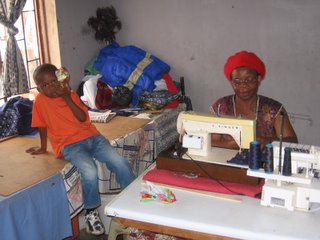Running back to
I just got back yesterday from three days in
We spent our three days interviewing staff members from SMFE as well as WVS. There was a general consensus among the staff that SMFE could be doing more when it came to HIV/AIDS programming for their clients. Of course, with any type of development project, funding is always the big question but there seems to be enthusiasm on both the part of MEDA and World Vision for further investment in this area. Hopefully we can see some more dollars being sent this way to help these plans take off. One of the good connections I made while on the trip was with SMFE’s operations manager George, an extremely talented guy with a strong passion for development and HIV/AIDS relief. He also seems to fancy himself as the “Jimi Hendrix of
One of things that impressed me the most about SMFE was their transitional loan communities that they have established for clients either infected or affected by HIV/AIDS. These special community banks, of anywhere from 8-20 clients, operate in the same manner as regular community banks except that interest rates are 20% and the required savings component is only 10% of the requested loan amount. This is an intriguing lending strategy and one that is not currently being pursued by any Mozambican MFIs. SMFE believes that the transitional loan communities will provide social support and financial relief to clients that are struggling under the impacts of HIV/AIDS in their households.
I should share a story about one of the clients in this community named Msesi Sibeko. She struggles to support her family through her dress making shop that she shares with two other women. Her husband passed away a few years ago, likely due to HIV/AIDS, leaving her to raise her two children as well as three orphaned children from her cousin, who also succumbed to the disease. The child on the left is named Nhiakanipho, which in English means “braveness.” She is thankful for SMFE for providing her with a loan of 500 Elangeni ($100 USD) to help pay for materials and rental fees. With future loans from SMFE she would like to purchase an embroidery machine so she could make fancier outfits and school uniforms. In addition to credit and savings through SMFE, Msesi has also received training in simple accounting, business management and HIV/AIDS treatment from WVS. However, supplying enough nutritional food for her children is still difficult and Msesi would like to see SMFE establish an emergency loan fund for households affected by HIV/AIDS to continue to provide their families with healthy food options during slow business periods.
After three days of Swazi hospitality we returned to the familiar stomping grounds of




4 Comments:
Something that I've been pondering Jared.
I know that MEDA, as a Christian organization, provides help to those in far off countries. A noble task indeed. But there are non Christian organizations that do the same. What evangelical role does MEDA play?
This won't lead to another "why did you hire a servant" discussion at all! I like the question Ty... but perhaps this isn't the forum - I'm not sure Pens likes these ones.
Good question Tyler,
MEDA takes the position that providing technical assistance in economic development is a legitimate form of ministry, even though it may not follow a traditional understanding of “evangelism.” MEDA works to provide people with the means to achieve their own economic and social development out of a belief that such work is consistent with the teachings of Christ and the mission of the global church. MEDA was an initiative of the General Conference Mennonites who do not take a very “overt” approach to evangelism (i.e. distributing bibles, showing the Jesus video, church planting, etc).
Nevertheless, MEDA was founded, and continues to operate, on the premise that Christian virtues, namely justice, prudence and servanthood, should be integral components of business and economic development. This is certainly a big part of why I pursued an internship with MEDA as it provided me with the ability to integrate my faith convictions with important development work. That being said, I do not really consider myself a “missionary” or an “evangelist” here in Mozambique, but I do consider myself a witness for Christ through the work that I am a part of in this country. Many of the world wide staff at MEDA would agree that their work is motivated by underlying faith commitments.
But this does raise a legitimate question about the “missionary” agenda of Christian development organizations…anyone else got any thought on this issue.
Jared,
I'm so happy for you that you have found an organization that you believe in and have had an opportunity to work with them. It's sounds like you've made quite an impact out there already!
Give me a ring when you get back to the 'peg!
Jolene
Post a Comment
<< Home